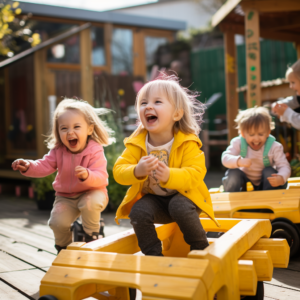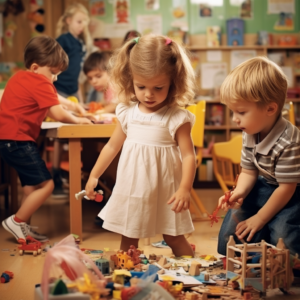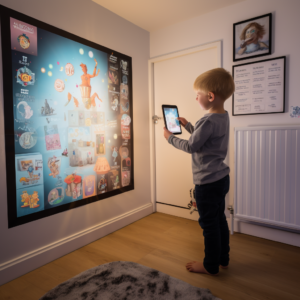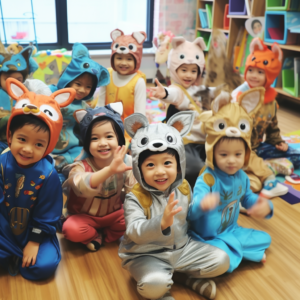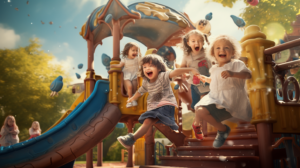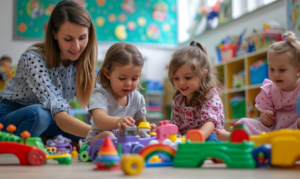In the ever-evolving landscape of early childhood education, UK nurseries are at the forefront of pioneering innovative teaching methods. These progressive approaches aim not only to enhance learning but also to cultivate critical developmental skills in young children.
This article delves into the various contemporary teaching strategies being employed in UK nurseries, examining their impact on children’s learning and development. Through this exploration, we will highlight examples of successful practices that are reshaping the future of early education.
Play-Based Learning
- One of the most significant shifts in early childhood education is the emphasis on play-based learning. This method recognises the natural inclination of children to explore their world through play. Nurseries across the UK are designing environments that encourage imaginative play, problem-solving and social interaction. This approach allows children to learn at their own pace and in a manner that resonates with their personal interests and developmental stage.
- Play-Based Learning: The Creative Haven Nursery, London
The Creative Haven Nursery in London exemplifies the success of play-based learning. In a recent initiative, they transformed their indoor space into thematic play zones, including a mini-market, a construction site, and a storytelling corner. Observations showed enhanced language development and problem-solving skills among children, particularly in those previously less engaged in traditional learning activities. The nursery’s approach has been recognised for its effectiveness in promoting cognitive and social development.
Outdoor Learning
- Another innovative approach is the incorporation of outdoor learning. Many nurseries are now extending their classrooms to the outdoors, recognising the benefits of natural settings in a child’s development. Activities such as gardening, nature walks, and outdoor play enhance children’s sensory experiences and promote a connection with the environment. This method has been shown to improve physical well-being, creativity, and social skills.
- Outdoor Learning: Forest Explorers, Bristol
Forest Explorers, a nursery in Bristol, has dedicated a significant portion of its curriculum to outdoor learning. They have developed a ‘forest school’ program where children spend time in nearby woodlands. Activities include building dens, wildlife spotting, and learning about plant growth. This exposure to nature has not only improved physical health and motor skills among the children but also fostered a sense of responsibility towards the environment. Parents have reported increased enthusiasm for learning and improved social skills.
Technology Integration
- In an age where technology is ubiquitous, some nurseries are integrating digital tools into their curriculum. This doesn’t mean excessive screen time, but rather the thoughtful use of technology to enhance learning. Interactive apps, digital storytelling, and educational games are used to support traditional learning methods, ensuring children are familiar with and can navigate the digital world.
- Technology Integration: Tech Tots, Manchester
In Manchester, Tech Tots Nursery has pioneered the integration of technology into early learning. They introduced an initiative where children use tablets to create digital art, engage in interactive storytelling, and play educational games. This integration has enhanced digital literacy and creative thinking. The nursery found that children who struggled with traditional learning methods thrived with the addition of technology, showing improvements in concentration and engagement.
Mindfulness and Emotional Learning
- Recognising the importance of mental health and emotional well-being, many nurseries are incorporating mindfulness practices and emotional learning into their daily routines. Activities such as yoga, meditation, and guided discussions about feelings help children develop emotional intelligence, resilience, and self-regulation skills.
- Mindfulness and Emotional Learning: Serenity Preschool, Edinburgh
Serenity Preschool in Edinburgh has integrated mindfulness and emotional learning into its daily routine. This includes morning yoga sessions, mindfulness colouring activities, and ’emotion corners’ where children can express and discuss their feelings. Since the implementation of these practices, the nursery has observed a decrease in behavioural issues and an increase in empathy and self-regulation among the children. Parents have noted that their children are more calm and emotionally articulate.
Cultural and Linguistic Diversity
- With the UK’s rich cultural tapestry, nurseries are increasingly focusing on cultural and linguistic diversity in their teaching methods. Multilingual staff, cultural celebrations, and a diverse range of books and resources help children to appreciate and understand different cultures, promoting inclusivity and empathy from a young age.
- Cultural and Linguistic Diversity: Global Kids, Birmingham
Global Kids, located in Birmingham, stands out for its commitment to cultural and linguistic diversity. The nursery employs staff from various cultural backgrounds and offers language lessons in Spanish, French, and Mandarin. They celebrate a wide range of cultural festivals, exposing children to different traditions and cuisines. This approach has broadened the children’s cultural understanding and acceptance, with parents reporting that their children show greater interest in learning about different cultures and languages.
The innovative teaching methods being implemented in UK nurseries are setting a new standard in early childhood education. By focusing on play-based learning, outdoor experiences, technology integration, mindfulness, and cultural diversity, these nurseries are not only enhancing the learning experience but also nurturing well-rounded, resilient, and empathetic individuals. As we continue to witness the positive impacts of these methods, it is clear that they are crucial in preparing children for the challenges and opportunities of the 21st century.



